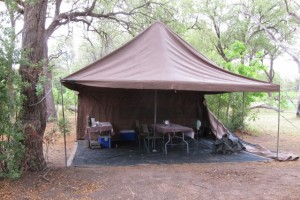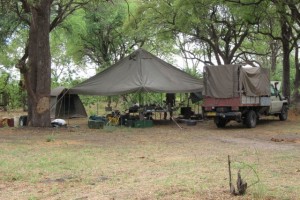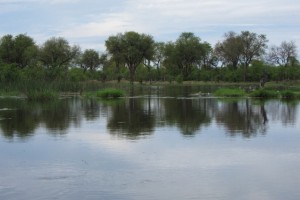We are camping, safari camping, not North American mountain camping. We have a tent just large enough to fit two cots and two small tables. Our cots have sheets, pillows and comforters on them. The tables have African motif cloths over them. Out the back door of the tent, is an enclosed space with a pit toilet and a bucket with a shower head, referred to in the literature as an ‘ensuite’ . Sort of indoor outdoor plumbing. Water is heated, poured into the bucket and the shower is ready. It was raining the other day, and we had warm showers outside in the rain.
We have a tent porch where I am sitting right now typing. Two chairs, wash basins and a gorgeous view.
There is a dining tent where we eat all our meals. The walls of the tent are removable so we may enjoy the view. The tent is large enough for a dining table (foldable) and a serving table and space to move around in.
The kitchen is a similar sized tent with tables, stove and firepit. Pula, the chef, and Dunega, camphand 1, toil away to create different gourmet meals each day. Murray is in heaven each day there is fresh baked bread and if you can imagine there is peanut butter in Africa. Pula’s dome tent is right behind the kitchen. Dunega, and Mosh (the waiter) share a dome tent which is placed a little way beside the kitchen. Pat’s tent is on the other side of the camp, about 50 paces away. There is an enclosed toilet tucked in behind some trees for the staff to use.
Pula comes to announce supper and always gives us a description of what is being served. He is accommodating my food issues with no problem and serves me tasty inventive dishes. I had potato and sweet potato “lasagna” today. He says he is going to teach me how to bake bread with rice flour and potato flour. It is very hard not to overeat!
Mosh serves us our meals and stands ready to fulfill our wishes. He told Murray that his job is to get us what we want before we even ask for it. He is a friendly fellow and Murray enjoys chatting with him. He plans on going to guide school next year after he has saved enough money.
We don’t see Dunega too much. He is the camp helper and works mostly behind the scenes helping Pula and doing chores. Pat says he is very shy so doesn’t say much.
I imagine that colonial life was much like this. Servants, no cooking, no work. This safari camping is a different life.
Murray’s insert
Today is we have a mokoro ride scheduled. The mokoro is a dugout canoe that has been used as transportation on the delta for eons. The people were using too many trees to build mokoro so a few years ago the government developed a fibreglass version that is used today. We ride in a fibreglass model. The driver poles the moroko while standing at the stern similar to a Venation gondolier. We sit right in the bottom of the boat like the cargo in a North American Indian canoe.
As we move along the river the silence is deafening. The poler makes no noise when he dips the pole; the slight splash along the side of the boat is hypnotizing. We pass a herd of elephants along the channel bank and can only hear the slosh of their footsteps as the move from patch of grass to patch of grass. It is midday so even the birds are relatively quiet; we hear only individual calls instead for the regular symphony that plays in the mornings and evenings. The tranquility and serenity is almost enough to lull us to sleep. Two hours later we are back on shore and on the road to find more animals.
Fifty meters off the main road there is a small ‘bachelor’ herd of elephants, four males of varying age and size. One of the almost adults and a full grown adult seem to having some sort of disagreement and are eying each other up. Without much warning they are butting heads and using their tusks to twist each other. It looks like a wrestling match. They break, but only for moment and then butt heads again, this time with much fervor. We hear the ivory of their tusks clack as contact is made. We are all madly snapping pictures. The tussle continues for a minute or two and the combatants part. The oldest male, who until now has been on the sideline munching grass, moves between the other two. He has obviously had words with the fighting two because the three stand head to head and intertwine trunks. I think the wise old elephant sensed when things were about to get out of hand and put a stop to it. It is too bad that the governments of the world cannot learn from the animal kingdom.
Botswana has not provided us with the abundance of animal sightings the Serengeti has, but the things we have seen here are very unusual. Luck follows Debbie and me on most of our adventures and this one seems to be not much different. Most that come here do not see lions kill a baby elephant, they will not witness two elephants tussling, to come upon an impala having trouble with child birth is unusual even to our guide, these things are the ways of the wild and we have happen upon more than our share.




